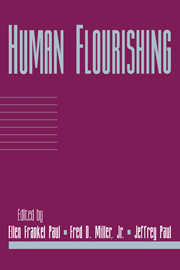Book contents
- Frontmatter
- Contents
- Introduction
- Acknowledgments
- Contributors
- Human Flourishing and the Appeal to Human Nature
- The Three Faces of Flourishing
- Flourishing Egoism
- The Idea of a Life Plan
- Human Flourishing Versus Desire Satisfaction
- Happiness and Human Flourishing in Kant's Ethics
- Valuing Activity
- Ancient Perfectionism and Its Modern Critics
- Aristotle's Elusive Summum Bonum
- Eudaimonism, Love and Friendship, and Political Community
- No Families, No Freedom: Human Flourishing in a Free Society
- Politics, Neutrality, and the Good
- Human Flourishing and Universal Justice
- Index
Introduction
Published online by Cambridge University Press: 05 October 2013
- Frontmatter
- Contents
- Introduction
- Acknowledgments
- Contributors
- Human Flourishing and the Appeal to Human Nature
- The Three Faces of Flourishing
- Flourishing Egoism
- The Idea of a Life Plan
- Human Flourishing Versus Desire Satisfaction
- Happiness and Human Flourishing in Kant's Ethics
- Valuing Activity
- Ancient Perfectionism and Its Modern Critics
- Aristotle's Elusive Summum Bonum
- Eudaimonism, Love and Friendship, and Political Community
- No Families, No Freedom: Human Flourishing in a Free Society
- Politics, Neutrality, and the Good
- Human Flourishing and Universal Justice
- Index
Summary
The ancient idea that happiness or flourishing should be the end of human action, and that the nature of this end can be objectively derived from claims about human nature or function, stands opposed to some commonly held views in contemporary moral theory. Many contemporary theorists believe, for example, that happiness is a subjective matter, varying from individual to individual, that morality is chiefly other-regarding, and that the pursuit of one's own good, far from being the purpose of moral action, is often in conflict with morality. Yet in recent years a number of theorists have sought to revive or adapt classical notions of human flourishing in order to give a more satisfactory account of the ends of human action and the relationship between virtue and self-interest.
The essays in this volume examine the nature of human flourishing and its relationship to a variety of other key concepts in moral theory. Some of them trace the link between flourishing and human nature, asking whether a theory of human nature can allow us to develop an objective list of goods that are of value to all agents, regardless of their individual purposes or aims. Some essays look at the role of friendships or parent-child relationships in a good life, or seek to determine whether an ethical theory based on human flourishing can accommodate concern for others for their own sake. Other essays analyze the function of families or other social-political institutions in promoting the flourishing of individuals.
- Type
- Chapter
- Information
- Human Flourishing , pp. vii - xvPublisher: Cambridge University PressPrint publication year: 1999

